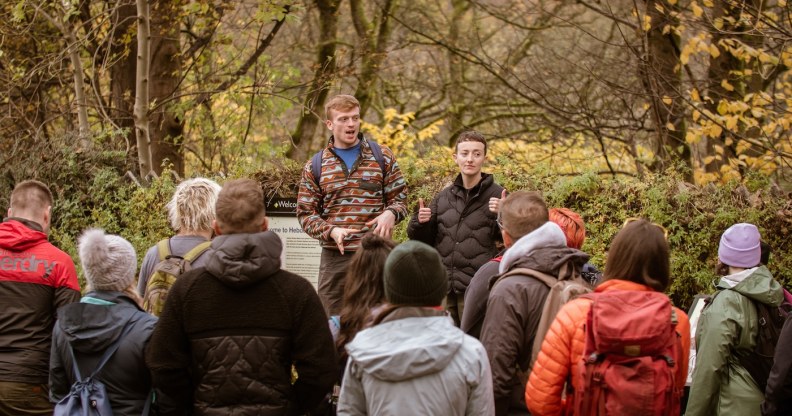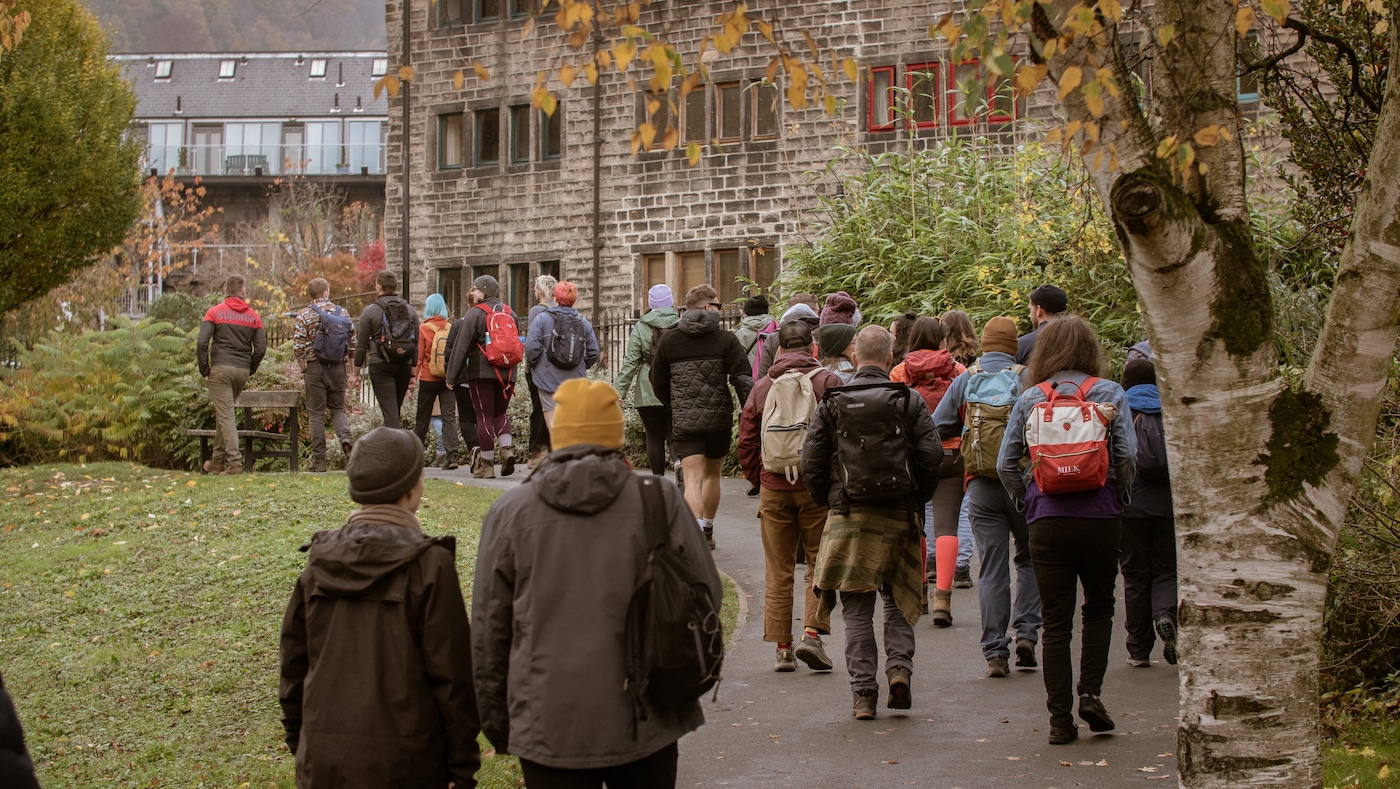Meet the queer hikers proving the great outdoors isn’t just for cis, straight, middle class folk

Ailish Breen (R) founded Queer Out Here. (Provided)
On a wet and wild day in January 2020, Ailish Breen went out for a hike with a group of queer people for the first time.
It was just two months before the UK was plunged into lockdown, and the event was titled “Hope for 2020”.
“That didn’t age particularly well,” Ailish laughs. Still, the walk was a success, and today Queer Out Here, a hiking group for LGBT+ people who want to find a sense of community in the great outdoors, is going from strength to strength.
Ailish had personal reasons for setting up Queer Out Here. They grew up in the Yorkshire countryside where a love for the outdoors was practically mandatory. After university, and a period in which they stopped exploring the outdoors, Ailish “rediscovered it and found how beneficial it was for my mental health and wellbeing”.
“It’s a great way to get out of the city every now and then, get some perspective, and I always feel better after it,” they add.
But they were also keen to challenge what they see as a lack of equality around access to the outdoors.
“I think a lot of people do feel that the outdoors is only for certain types of people,” Ailish says. “People think it’s for middle class, white, heteronormative families, or there’s there’s the really outdoorsy people who’ve got all of the gear, which can be really expensive.”
Ailish Breen wanted to challenge heteronormative, macho ideas about the outdoors
There’s also a “macho” side to the outdoors – plenty of people take on extreme challenges. The idea alone can be alienating for queer people.
“People often talk about bagging a mountain or a hill and it’s very much about conquering the outdoors,” Ailish says. “I can totally see that that would not be super welcoming for a lot of people.”
Among those who might not find that atmosphere particularly welcoming are trans and non-binary people. Ailish was thinking specifically about the trans and non-binary community when they set up Queer Out Here.
“So much of the horrible narrative, not just around trans people but queer people in general, is that there’s something unnatural about us,” Ailish explains. “I just wanted to see what the power of being in nature and realising that you’re part of nature would be.
“We do have loads of trans and non-binary people that come on our walks, and that feels so powerful and empowering when we’re all walking together in a big group in the Peak District and in these rural areas where we don’t see groups of people that look like us all the time. There’s something that feels quite political and powerful about that.”
Something special happens when a group of LGBT+ people get together – that’s part of the reason that, for now, Queer Out Here is exclusively for the queer community.
“We may well have friends and family walks in the future, or walks with allies, but for now, we really want people to feel absolutely safe, like they don’t have to feel any fear about coming along,” Ailish says.
Queer people who don’t drink alcohol need their own spaces
Another factor in Ailish setting up Queer Out Here was that they had given up drinking about a year earlier.
Suddenly, they realised that they weren’t seeing any other queer people.
“I wasn’t in queer spaces anymore,” Ailish explains. “I had my friends, but I wasn’t feeling part of the fabric of the community because I wasn’t going to bars. We need alternatives that are purely beneficial for wellbeing and mental health.”
The lack of LGBT+ spaces that aren’t alcohol-centric is particularly problematic for those recovering from addiction.
“Alcoholism and substance abuse is really high in the queer community for various and obvious reasons. We have to be able to have spaces for people who want to move away from that but still want to be part of their community.
View this post on Instagram
On the last Queer Out Here walk, there was a welcome circle where everyone was asked to introduce themselves, state their pronouns and tell the group what the outdoors means to them.
“I was really struck by how many people said, ‘I need this,’” Ailish says. “There was about 50 people on that walk and I’d say 15 to 20 people said they needed the outdoors and they needed to come on this walk. That really stood out to me.
“We had one person who came along who said that this walk was really the first time they’d been properly out of their house for a few months. Because of the pandemic, they’d gotten used to staying indoors. We had another person who said they’d never done anything really with the queer community before – they’d never been part of an LGBT+ anything, but they felt comfortable joining Queer Out Here. They were really loving the political nature of going walking together.”
Ailish is now hoping to expand on their work with Queer Out Here by providing training to other outdoor groups and organisations.
It always baffles me that outdoor clothing is still so gendered in stores.
“I’d really like to help other organisations become more queer inclusive so that ripple effect can happen across the outdoor industry,” they say. “I’d like to see the wider industry start to think a little bit more about how they can be more diverse and make the outdoors more accessible to different communities.”
“Brands should start thinking about the kind of imagery they use to promote the outdoors,” Ailish continues. “Show people with different types of bodies, not just thin white people, and not just very gendered imagery. It always baffles me that outdoor clothing is still so gendered in stores. It’s got to be some of the most genderless clothes available – it just needs to be waterproof. The shop doesn’t need to be split into two sides. I always find that super weird that we’re still doing that, so maybe people should think about that.”
In the two years since Queer Out Here came into being, Ailish has learned helped dozens of queer people come together in a safe, inclusive and friendly environment – a queer community far removed from the confines of bars and clubs, something all too many are crying out for.
“I just wanted to offer that to my community, I guess, because the mental health benefits of being in nature and exercising in nature are widely documented,” they add. “Over the last two years in particular, I feel that the queer community is in particular need of that support.”
Sometimes, creating a space can be as simple as getting a group of queer people together and going for a walk.
If you’d like to find out more about Queer Out Here, you can contact Ailish through their website.


